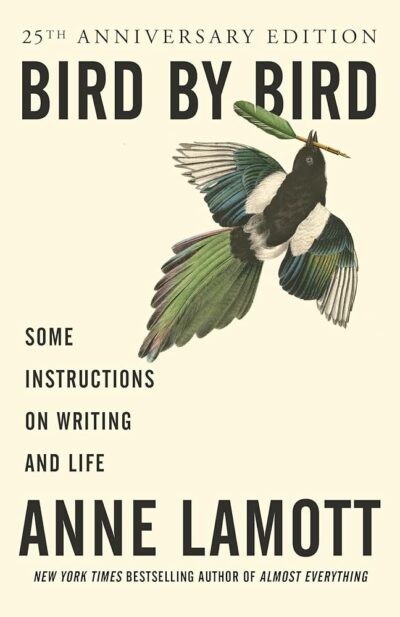Thoughts from
Jim Teague
FPCE director of communications.
 I recently read the book “Bird by Bird: Some Instructions on Writing and Life” by author Anne Lamott. Truthfully, I didn’t read the book. As is my way more and more, I listened to it as an audiobook. This one was narrated by Lamott herself. Her unique voice and self-deprecating manner made it one of those special pieces I found myself making excuses to go driving for so I could listen uninterrupted.
I recently read the book “Bird by Bird: Some Instructions on Writing and Life” by author Anne Lamott. Truthfully, I didn’t read the book. As is my way more and more, I listened to it as an audiobook. This one was narrated by Lamott herself. Her unique voice and self-deprecating manner made it one of those special pieces I found myself making excuses to go driving for so I could listen uninterrupted.
The title comes from an anecdote Lamott shares about the process of getting something challenging done without being overwhelmed:
“Thirty years ago, my older brother, who was ten years old at the time, was trying to get a report on birds written that he’d had three months to write. [It] was due the next day. We were out at our family cabin in Bolinas, and he was at the kitchen table close to tears, surrounded by binder paper and pencils and unopened books on birds, immobilized by the hugeness of the task ahead. Then my father sat down beside him, put his arm around my brother’s shoulder, and said ‘Bird by bird, buddy. Just take it bird by bird.'”
If you consider yourself a writer by any stretch of the imagination, I highly recommend the book. At times irreverent and drawn from her life experiences (which include addictive behaviors and a somewhat bohemian lifestyle), it may not be everyone’s cup of tea. I found it encouraging, touching, and mostly hilarious.
The entreaty to take life’s hard tasks “bird by bird” really speaks to me. It’s the idea of “eating the elephant one bite at a time” and not getting bogged down by the big picture. I think there is something to be said for adopting that kind of mentality as a church as First Pres moves toward opening the search for a new senior pastor.
Rev. Dr. Tassie Green, our interim senior pastor, is great at this. She will often remind the staff or lay leaders that we are only on step 28 (or some such number) of the 310-step process of hiring someone new (it’s really only 64 steps). She will then go on to encourage us to keep focused on the tasks at hand rather that being too concerned about whether or not we’re on schedule (hint: there is no schedule we have to stick to, so long as we end up with the new pastor God had led us to).
Lamott repeatedly stresses the importance of pursuing honesty and creativity as a writer over the goals of being liked, getting published or getting great reviews by those who read one’s work. She is quick to acknowledge how difficult keeping those priorities in proper order can be.
“If something inside of you is real, we will probably find it interesting, and it will probably be universal. So you must risk placing real emotion at the center of your work. Write straight into the emotional center of things. Write toward vulnerability. Risk being unliked. Tell the truth as you understand it. If you’re a writer, you have a moral obligation to do this. And it is a revolutionary act—truth is always subversive.”
When I hear phrases like “risk being unliked,” my pulse quickens, and I start to sweat. I really like being liked. As a kid and young adult, I did my best to be liked by everyone, even if that sometimes meant reinventing myself to be more likeable by friends, teammates, coworkers, and family members. The result, however, was that I became so good at being a different me depending on the situation that I lost sight of where the pretend me stopped and the real me started.
I finally had to step back and evaluate what I was doing to make others like me and whether or not they were honest expressions of who I am and really want to be. In many cases, they just weren’t. For instance, I am part of a group text with friends from college and I was always (yes, always) trying to be “the funny one” or “the witty one.” It got to the point where I was working so hard at being funny that I began to come across as sarcastic and even snarky or unkind at times.
While I love being funny (a trait I highly value in others, too), the way I presented myself in the texts became more about being liked or admired and less about me just being me. Ultimately, I had to trust my friends would either like me for who I truly am, or let the friendship change or even die. Either way, I will be better off working on being who I believe God made me to be rather than playing a role for the benefit of others.
In seeking a new senior pastor, we are taking time to examine ourselves as a church. This is crucial. The last thing we want to do is pretend to be a church that we’re not or claim to be strong in gifts or traits we don’t really do so well in after all.
Of course, that doesn’t mean it will be easy. However, I believe if we remain committed to the process of self-discovery rather than overly concerned (for now at least) about the outcome, we will end up being content with whatever comes.
Lamott says writers “are lucky to be one of those people who wishes to build sand castles with words, who is willing to create a place where your imagination can wander.” While the sand castles our stories create are not permanent, that’s okay because the ideas and thoughts and words remain.[1]
I’m confident that the benefits of us being lovingly honest with one another throughout this process of self-examination will far outlast any fear we might have in the short term.
[1] “You are lucky to be one of those people who wishes to build sand castles with words, who is willing to create a place where your imagination can wander. We build this place with the sand of memories; these castles are our memories and inventiveness made tangible. So part of us believes that when the tide starts coming in, we won’t really have lost anything, because actually only a symbol of it was there in the sand. Another part of us thinks we’ll figure out a way to divert the ocean. This is what separates artists from ordinary people: the belief, deep in our hearts, that if we build our castles well enough, somehow the ocean won’t wash them away. I think this is a wonderful kind of person to be.” ― Anne Lamott, Bird by Bird

